Your Top Questions Related To Root Canal Treatment
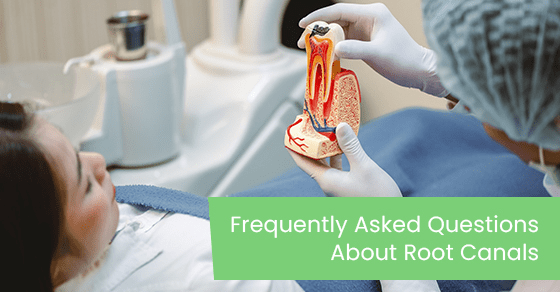
Have you been told your tooth/teeth need a root canal treatment?
It’s absolutely fine!! There’s no reason to get scared because root canal therapy is not as scary as you may think it is. In fact, getting a root canal may be your best way to save your natural tooth/teeth.
What Is Root Canal Treatment?


When the soft tissue (pulp) of your teeth or tooth is inflamed or diseased, Root Canal Treatment is advised.
Commonest reasons being deep caries, cracks, cusp fracture, repetitive dental procedure and trauma. Trauma can not only cause inflammation and can also lead to tooth discoloration, and if not treated in time may lead to severe pain and also can form abscess or cyst.
Signs and symptoms which indicates Root Canal Treatment:
- Sensitivity to heat & cold persisting for a long time.
- Discoloration of the tooth.
- Tenderness in the affected tooth during biting or consumption of hot and cold or hard food items.
- Gum swelling in the area of the tooth.
If the tooth doesn’t have pain, why do I need a root canal treatment?
- Many times you might experience pain initially and later it subsides due to the use of Antibiotics or Analgesics but considering the tooth has become alright is not right, it has just gone beyond the patients pain threshold limit.
- There are chances that you might never feel the pain as infection would have reached an advanced phase and it might be discovered only during routine clinical examination.
Root canal treatment is done to eliminate the infection residing in your tooth and surrounding structures. The treatment is done to restrict and stop the spread of the infection and further damage to the teeth.
Is root canal treatment a painful procedure and do I need to worry?
- The answer will be no in 99% of the cases, with use of anesthesia, apex locators and modern rotary instruments the comfort levels have improved. Coming to the 1% population, some teeth are resistant to the effect of Local Anesthesia. These teeth are usually called as HOT TOOTH/ HOT PULP due to the hyperinflammation of the pulp tissue. During the RCT opening a small access is made and a little amount of anesthesia is directly delivered on to the tissue to achieve anesthesia.
Will There Be Any Pain After RCT?
- The tooth may experience some amount of pain & inflammation in first few days following the treatment it is because the dying bacteria releases some toxins which brings these inflammatory changes and this happens to only 1% population. To avoid this, you will be prescribed antibiotics & painkillers.
- The level of pain is usually very low and it gradually reduces. Pain on eating or chewing indicates healing and food needs to be chewed from the other side till the pain subsides. If some teeth /tooth swells and if you feel the healing isn’t good you can immediately contact the Endodontists.
What Is The Time Duration Of Root Canal Treatment?
- Depending upon the level of infection, clinical condition and the anatomy of tooth treatment time may vary for you. If the infection is acute it can be addressed in one appointment with a time duration of 60-90 mins. Sometimes if the level of infection is more or it is chronic in nature it might take 2-3 sittings with time duration 30 -45 mins per sitting.
Why Do I Need A Re-Root Canal Treatment
- Even with the proper care, endodontic treatments occasionally need to be repeated, as the tooth becomes painful or diseased after months or years of treatment. If the healing fails and develops symptoms like pain & swelling, retreating the tooth helps it heal and can stay for lifetime.
Major Reasons For Re-RCT
- Narrow & Curved canals not treated properly in the initial treatment.
- Undetected canals due to complex anatomy Delay in placement of crown or restoration.
- Salivary contamination due to improper coronal restoration.
- New decay which has exposed the root canal filling causing new infection.
- Loose, crack/broken restorations or crowns has exposed the tooth.
- Sustained Fracture
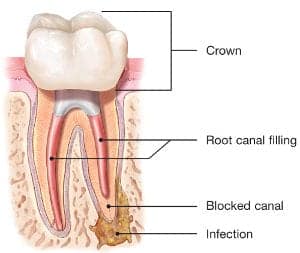
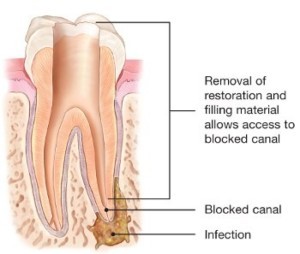
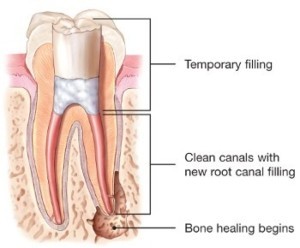
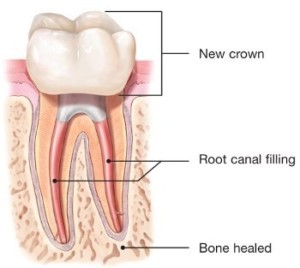
TREATMENT PLAN:
- At first, treatment plan will be discussed with you. If you and your Endodontist both agree for the retreatment option, the previous crown/cap placed on the root canal treated tooth will be removed ( if required). Then the permanent restoration will be removed to gain access to the previously done root canal.
- Post this the previously filled canals will be cleaned by retrieving the older materials and a through inspection will be done for any missed canals, and also if the tooth has unique anatomy, the tooth will be treated using advanced technology.
- If the previous improperly done root canal filling has lead to infection in and around the external peripheries of the tooth, an intracanal medicament will be placed inside the canal and left for sometime or LASER disinfection will be taken as a choice.
- If the infection subsides canals will be cleaned once again before filling and it will be filled and sealed and a permanent restoration will be done.
After few days you will be required to visit for a follow-up, and if your crown was removed a new measurement for the cap will be taken and a new cap will be fabricated to restore the form and function of the teeth.
For further queries and information contact us @ ROOTS & DENTISTREE


